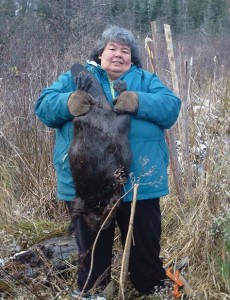by Jim Dickson
[pullquote align=”right” cite=”” link=”” color=”” class=”” size=””]Canada’s Cree Indians
balance their traditional life
in the bush with demands
of the 21st Century.[/pullquote]
Survival is a hot topic these days but not everyone grasps that it must be a sustainable lifestyle that can carry you through the rest of your life. Too many people think of it as a B-movie endurance epic.
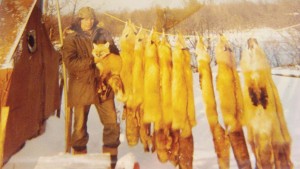
Billy Isaac grew up in his family’s tradition of hunting and trapping, and has passed his wilderness skills to his seven children. When fur market prices are right, the trap harvest of fox pelts shown would help feed his family.
There is no long term future there. The key to it is to be able to live like people did in previous centuries so that when the lights go out and they don’t come back on you won’t starve. Gardening along with a traditional hunter-gatherer lifestyle is the key here. You have to be able to function just like your ancestors did. Being at your bug-out shelter when a crisis happens is critical as travel may be impossible when the SHTF. The solution is to move there and find a way to support yourself in wilderness areas.
As in every endeavor it behooves you to look at those who have gone before and been successful. This article focuses on one of the best examples.
Not everyone has given up the best of the old traditional hunter-gatherer lifestyle because of civilization’s demands. The Cree Indians of Canada are a shining example of how you can have it all. They have struck the best balance possible between the old ways and the 21st Century, continuing to fish, hunt, and trap as they always did while still holding modern jobs in the 21st Century. Here are some examples.
Billy Isaac of Moose Factory, Ontario, was raised in the bush where his parents hunted and trapped for a living. He is now married with seven children who have all been taught how to live off the land and travel safely on the water and ice in the winter. By raising his family the old traditional way he was able to protect them from the corruption of modern society and instill in them the proper values.
Time spent with the family in the bush and on a trap line is of far greater value than any so-called “quality time” spent in civilization’s environs. Isaac ranks as a sterling example of a good father and family man. While he was raising his family in the 1980s, he supported them by hunting and trapping as well as guiding for goose camps. He made good money trapping beaver, otter, mink, martin, wolf, and fox until the price of furs dropped.
Isaac then got a job as the Aboriginal Knowledge Researcher for Moose Cree First Nation, where he interviews the elders to gather and preserve their information for posterity. His job also requires him to work with archeologists and environmentalists. He monitors river water levels and quality as well as wildlife. Photographing wildlife is also part of his job. His work enables him to spend a lot of time in the outdoors he loves. He still traps on weekends.
Joshua Sutherland owns and operates North French Adventures where he guides boating adventures for fishermen and women in seach of walleye, Northern pike, sturgeon, and brook trout. The North French River is one of the most pristine untouched waterways in Ontario and the wildest in the Moose Cree homelands. During the spring and fall seasons he sets nets for whitefish and gives demonstrations of how and where the Cree set nets.
Sutherland also offers his guests traditional Cree cooking and will also teach the guests how to do it themselves. The Cree are some of the best cooks of all the Indian tribes and Joshua is also a certified chef that has worked in the best restaurants in large cities. He takes bird watching tours and boat rides to James Bay to see the beluga whales and seals. In the winter he also offers tours of his own trap line where he shares stories of the Cree people. He guides bird shooters as well as moose and bear hunters. The moose and bear hunters are taken to the hunting area by boat or helicopter.
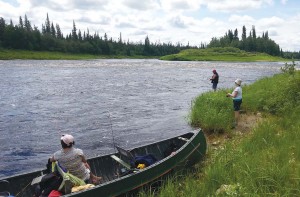
Guide Joshua Sutherland and his canoe rest on a scenic Ontario river bank while two of his clients fish from the bank.
There is good reason to choose a Cree guide. They are fun to be with. The Cree are the happiest, friendliest people that I have ever seen and I have been all round the world. They love to laugh and are good company. You will simply have a better time with them than with anyone else. They are also world renowned as hunters and fishermen. Joshua’s family is especially famous among the Cree for being expert fishermen who always know where the fish are, a tradition that goes back to his great grandfather. Southerland is your best guarantee of a successful trip and like all Cree he wants his guests to have a good time. I don’t know how anyone could not have a good time among the Cree.
He has chosen a job that allows him to be what he is, a bushman. He can be reached at: Joshua Sutherland, North French Adventures, PO Box 814, Moose Factory, Ontario POL 1WO, Canada; phone: 705-336-8736; online: northfrenchadventures@outlook.com
Edith Larocque of Chapleau, Ontario, is a member of the Bear Clan, a mother of four and grandmother of three. She works as a finance clerk for Chapleau Cree First Nation alongside Connie Martin. They process invoices and payments and oversee the payroll. Larocque also works on the General Ledger of their accounting software program where she makes sure entries are correct and charged to the correct department to insure all programs and budgets are maintained and balanced.
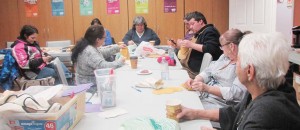
Edith Larocque, center at end of table, is shown training other Cree in making fur mittens and moccasins.
However, when the fiscal year ends on March 31, it’s off to the bush the same as when she takes a holiday. Her kids used to complain: “Mom! Your sister takes her kids to Holland and London when she gets time off and you take us 40 miles back in the bush!” Well, her kids know their way around in the bush now just like they are supposed to and they have the skills to pass on to their kids.
While her grandfather was a trapper, her family took government jobs and Larocque had to get other people to teach her the ways of the wild. A bright and eager student, she soon picked up the old skills. She loves fishing and trapping and hunts moose and partridge every year, often taking young people afield with her to teach them as well. She shares her fish and game with her community. A genuine concern for others is one of the hallmarks of a Cree Indian.
Her role in the Cree community as a hunter, provider and teacher resulted in her being nominated by Elder Marjorie Lee as a “Phenomenal Woman.” You have to bring in a lot of game and be a first class teacher of wilderness skills to get an honor like that from the Cree Indians. World famous as hunters and woodsmen, they are not easily impressed. She serves as a shining example that you can be skilled in all the old ways even if you didn’t get the traditional start with your parents teaching you. One thing is certain. No one enjoys the bush more than Larocque.
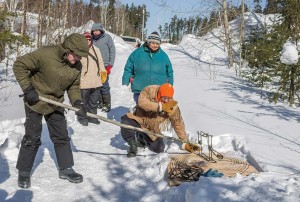
The Cree pass along their wilderness survival and income skills to younger generations as in this trap setting demonstration which is part of the course.
If you want the best of both worlds, retaining the old ways of the wild while still coping with the 21st Century, you have to have your priorities straight. You have to put wilderness first and then find a way to make a living there or on the outskirts of it. Success is not all about money. It is about happiness and family. The contrasts between the Cree families that I have seen in the bush and the families in the big cities of the US and its suburbs are vast and leave no room to doubt the superiority of the old ways of the bush. Money isn’t all it’s cracked up to be. I have seen a lot more unhappy and even suicidal rich city folks than I have seen unhappy Cree.
And they manage to survive in both worlds.

